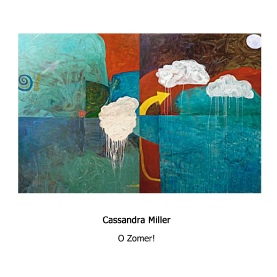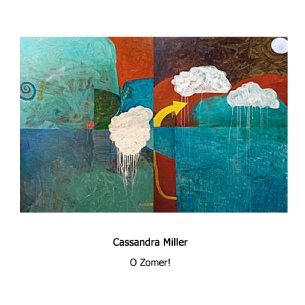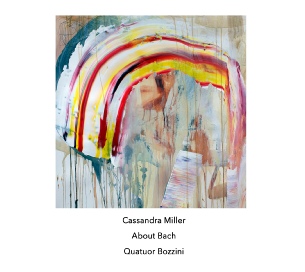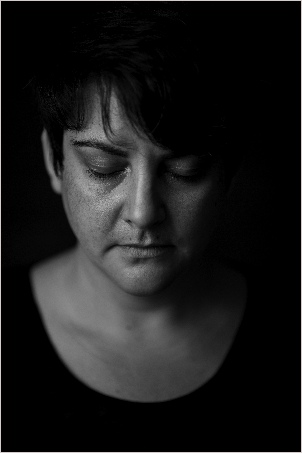Another Timbre TimHarrisonbre

at126 Cassandra Miller - ‘O Zomer!’
1 - O Zomer! (2007) 8:05
Apartment House
2 - Philip the Wanderer (2012) 14:36
Philip Thomas (piano) & Clemens Merkel (whistling)
3 - For Mira (2012) 6:06
Mira Benjamin (violin)
4 - Duet for Cello and Orchestra (2015) 31:58 youtube extract
Charles Curtis (cello), BBC Scottish Symphony Orchestra,
conducor Ilan Volkov
Interview with Cassandra Miller
Extracts from the extended interview with Cassandra Miller in the Canadian Composers Series booklet accompanying the ten CD’s in the series.
What did you make of Linda Catlin Smith’s comments in her interview about Canadian composers having a kind of freedom, with no pressure to fit in because they are so removed from and ‘unexamined by’ the major cultural centres and traditions of the world?
It’s really interesting to hear Linda say that, and I’ve said similar things myself. When I grew up in Canada and went to the University of Victoria as an undergraduate I had nothing to compare it with because I didn’t know that anything else existed. That was my first encounter with the idea of what musical composition was. Christopher Butterfield was my teacher – he still teaches there – and in my second year we flew Linda Smith out to give us some lessons, and Martin Arnold’s music was being played all the time – I remember hearing his piece Contact; Vault played for what must have been nearly the first time. So this was just normal to me and only when I came to Holland ten years later to do my masters’ degree did I start to understand what the European scene was like. The idea that there was a career composer, someone who had a career and thought that was important, and the idea that there was this thing called ‘culture’ which had a certain importance to it, that was something which I’d never even considered or heard of. The idea that culture somehow speaks to human consciousness or was important to humans in general, I’d just never come across that concept. I think Linda was trying to explain to a European what they’d find if they showed up in Canada, whereas I grew up in Canada and then went to Europe and thought ‘hey, what is this?’
I felt this sense of free outsiderness growing up in Victoria, and you find it a bit in Vancouver, and then Toronto has gone through phases of being very strange. Certainly Arraymusic has been a centre of strangeness, though coming and going through the 80’s and 90’s. I was there in I think 1998 doing their Arraymusic workshop, and Linda Smith was around and lots of other lovely people and it had this very free feeling. I think the story of English Canada is that it teeters between very free and wonderful and strange, and then kind of non-existent, with not enough energy to get things going, where people are abandoned and there’s not really a conversation. Some years are more one thing and some more the other. So there’s a lot of times when we’re struggling and nothing’s happening, but you won’t hear about it over here, and then it’ll tip over into being quite amazing, and then you will hear about it.
So when you went to the University of Victoria as an undergraduate without having heard of this European notion of music as culture, what sort of music were you into, and why did you go there?
Well I went thinking I was going to study harp because I was quite a serious harpist when I was young. But then on my first day I took an elective class for composition with Christopher Butterfield, and it was clear by the end of the first hour that I wasn’t going to be a harpist any more, that I was going to be a composer.
It was that quick? What happened?
I can’t remember exactly what happened in that class, but it was a really good group of students that year. There were about twenty of us, and André Cormier was there, but Christopher Butterfield just had such a great way of teaching. He’s very interested in absurdity, and is influenced by Dada art, so he tends to present art as being interesting only if you can’t really understand it, and that it’s normally made by someone on the margins, not by some canonical figure. And he had a way of talking about it so that we didn’t really distinguish between Schoenberg and Webern on the one hand and Wilhelm Killmayer on the other – who even in Germany people haven’t heard of, though he’s amazing. So there’d be all these very odd figures, like Harry Partch and so on, in a way the stranger the better. To learn about Webern for the first time in that context, you think ‘God, he’s weird!’
Which he is in a way, but one weirdness among others rather than the official weirdness.
Exactly, we had no idea that there was an official weirdness. Two years later there was the twentieth century techniques class where you’d analyse all the canonical stuff. But until then we didn’t get the sense that there was a canon. We thought composers were like Linda Smith, not like Lachenmann or anyone with a canonical reputation.
So you ended being there for ten years?
Yes, it was ten years before I graduated. It was a four year programme, which is normal in North America, and I never took full-time course load because I’m a bit slow at stuff. So normally I would have finished within six years, but after six years I still had a couple of credits to get and I was a bit desperate to leave town, so I moved to a small island outside of Victoria. At that time I was having big problems with writing block, which I’d struggled with throughout the six years, but it came in larger and larger waves. I’d had my first quasi-professional commission before I moved to Salt Spring Island and I was late handing it in, and I kept just staring at a blank piece of paper for months. I was so miserable that I thought ‘shit, I don’t need to do this’, so I quit. So I went to live on Salt Spring Island and did a bunch of other things. I was a choir director for a while and a homecare worker, and I sort of pieced together work as you do on these small islands, where you don’t really have a regular job. After two or three years I ran out of money and ran back home to my mother at the age of 29, and she wasn’t very well at that time either. I ended up getting a job as a house-cleaner for a year. Then I got inexplicably ill; I was really dizzy and couldn’t stand up. I slowly got better but I still didn’t have any energy, and I went to see my doctor and he said ‘Aren’t you a musician?’ I said, ‘Well I was... A couple of credits away from graduating.’ He said, ‘Well I don’t think you’re going to get better until you go back to school.’ He was right. I went back to school and got better and very quickly finished my bachelor’s degree, but ten years after I’d started. Then immediately after that I went to Holland for my masters.
[.........................]
Tell us about the Duet for Cello and Orchestra, which was so well received at the Tectonics Festival in 2015?
Well that’s something that I’m still trying to get my head around. Funnily enough I’d sort of been in contact with Ilan Volkov, the conductor of the BBC Scottish Symphony Orchestra who organises Tectonics, for quite a while. When I was organising the concert series in Montréal I’d sent him an email saying if you ever want to do a project in Canada let me know. But I don’t think he would even remember this because we never heard back, and we didn’t really have enough money to make anything serious materialise anyway, though we liked to dream. But the Tectonics thing really came out of James Weeks and EXAUDI, because they’d asked me to write a piece – Guide – which they then performed when they were at Tectonics. So that was when Ilan Volkov will have first heard my music, and I guess he looked into the rest of it, and then he approached me out of the blue to ask me to write a piece for Tectonics the next year. He said that Charles Curtis would be there and did I want to write a concerto for him.
So that was presented to you, it wasn’t your proposal?
No that was Ilan’s idea, and I was like ‘O my God, ok’.
I know Charles Curtis has done minimal things before, but it must have taken some nerve to have a performer of that ability and present them with a solo part in a concerto that is so minimal.
Well it was all a bit strange because I knew that I wanted the orchestral part to be based on this Italian folk song because I knew I wanted the orchestral quality of what that was going to become. But I didn’t know what I was going to do with cello part. So I arranged to meet Charles Curtis in Paris when he was there and we worked together for a week. At that point I was still giving him all sorts of versions of the folk song to try out. And, although it was wonderful to get to talk to him about music and get a sense of his personality, none of it really worked musically. So at the end of the week I still had no idea what to do with the cello. But I knew how long it takes to write all the orchestral parts, so I thought well, I’ve just got to get on with that and trust that something will come up for the cello part linked to the Italian folk song. So I finished the orchestra part and was very happy with that, but I still didn’t know what to do with the cello. People who knew me thought I was insane to do it this way, and to be honest I was shitting bricks, trying all different things with the folk song but getting nowhere. Then one time I tried something out on my computer, but didn’t like it, so deleted the cello part, but for some reason it only half deleted it and what was left was this one-five-one. So when I pressed play I heard by accident what it sounded like together and I thought, ‘Oh shit, that’s it!’
So that was a very happy accident, but then because it was for Charles Curtis it kind of made sense it being so minimal. But it’s funny when people ascribe me the credit of thinking of something like that, because I can’t claim it, though I suppose I can take credit for choosing to go with it once I’d found it. But when I sent it to him I was still anxious about what he’d think, and he’s not much of an emailer, so all I could get back was ‘Well I have to admit I am a bit perplexed.’ But then I think he grew to like it quite a bit, and at least understand why I’d want to do that. I think as soon as he’s on stage it becomes clear why it has to be him playing it. I mean other people could do it perhaps, but he’s just so still when he performs it, it feels like it’s his piece really, his personality.
I want to ask about voice in your music. In general I’m not that keen on voices in contemporary music, but your work is one of those cases where somehow I do get it, and in fact even in pieces where you don’t have a vocal part, it feels like there’s a singing or cantabile quality to your music. Do you think that’s true?
Yes for sure, and in fact this has become the topic for my PhD. The word I use is ‘vocality’, which is a kind of musicality about the voice. I’ve used transcription in my practice for a while, but I discovered recently that all this stuff I’d been transcribing was actually about the voice. Either it was a transcription of something directly vocal, or it was a performance where someone had done something on an instrument that seemed to me to have a vocal quality, like with Pemi Paull playing the Bach chorale, and through transcribing it I was trying to grab that quality. And that realisation has led me to my most recent work, which is quite different, and is largely based around the voice, where either I myself or a collaborator singing is part of the composition process for the piece.
I’m always drawn to the voice. I find it the most engaging thing; when I’m listening to anything if I hear a human voice I’m just immediately engaged. It’s as simple as that. Now you say you don’t like voice in contemporary music, but perhaps in a way we’re a little bit similar. Because I think that what you’re reacting against is an element of presentation that normally occurs with the performing voice, and what I’m most interested in is when the voice somehow gets away from that. The voice is so complex and we understand so much from it that can’t be described. And I think that my interest in the voice and your lack of interest in the voice are both about trying to find a space where it’s not about this performance thing or public identity.
Right now the work I’m doing started with a piece I tried to write for a viola d’amore, for Jennifer Thiessen, and I ended up writing her more or less a vocal piece. She does meditation and I had her sing along to things while she was meditating and we’d record it. Then I’d play back the recording and she’d sing along to that, and so on until it slowly degraded into something that sounds a lot like sighing, and that became the piece. And then that led on to my collaboration with Silvia Tarozzi, a violinist in Italy, where it’s largely between her as an improviser and me as a singer. But I’m not a singer, I’m a terrible singer, but we’ve made some pieces where I’m meditating and going into a trance and singing into my computer. And I’m such a bad singer that again it gets away from this performerliness. And I’m trying some of these techniques now with the soprano Juliet Fraser, which is very different because she’s such a trained singer, but she also has this interesting relationship with public identity and performerliness. So together we’re trying to find a space that’s much more intimate and vulnerable, which in her case becomes really interesting because she’s got this extraordinary instrument.
This reminds me so much of Frank Denyer’s piece A Woman Singing, which Juliet performs in an amazing intimate way, and is one of those few contemporary pieces for voice that I really can relate to.
Exactly, most people when they present their voice, because it’s so personal, it becomes so performative and polished by the time it’s published. It’s rare to hear something that comes from that other space.

Cassandra Miller,
photo by Andrew Parker



Cassandra Miller
Photo by Andrew Parker
For a special offer on all 10 CDs in the Canadian Composers Series, go here